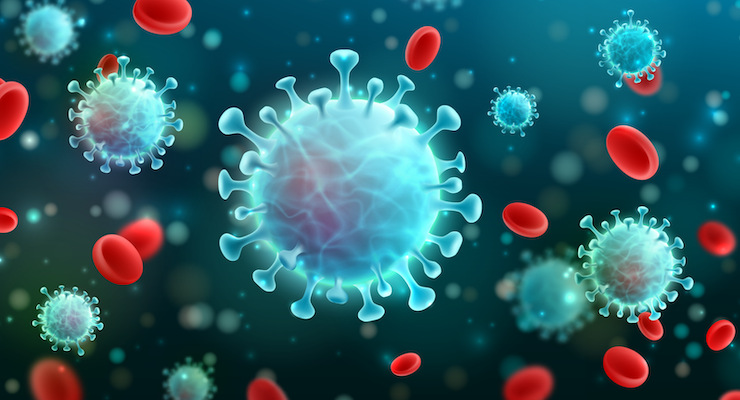06.16.21
A newly-published study built upon early findings that there was a significant correlation between serum vitamin K2 status and severity of COVID-19 symptoms confirmed that, on average, hospitalized patients with COVID-19, on average, had lower vitamin K status than a healthy population control.
A team from the Bispebjerg and Frederiksberg Hospital in Denmark, led by Allan Linneberg, MD, PhD, Director of Center for Clinical Research and Prevention, collaborated with Kappa Bioscience, supplier of the vitamin K2 ingredient K2Vital, on further vitamin K-research, which led to the funding of two postdoctoral positions.
The present study, published in Nutrients, repeated previously-confirmed research to investigate the hypothesis that low vitamin K status might be a common characteristic in hospitalized COVID-19 patients, also investigating whether vitamin K status could be a predictive factor of mortality in these patients.
Vitamin K2 status was analyzed in 138 COVID-19 patients and compared to a control group of 138 people from the general population, matched for age distribution. Vitamin K2 status was significantly lower for COVID-19 patients compared to the control population.
43 of the hospitalized patients with COVID-19 died within 90 days of admission, and survival analysis showed that lower vitamin K2 status was associated with a higher mortality risk.
The authors of the study created a Kaplan-Meier plot of the cumulated risk of death, stratified by serum dp-ucMGP levels (a biomarker of vitamin K2 status), the results of which implicated vitamin K2 status with mortality risk.
“Although this association was partly explained by increasing co-morbidity with decreasing vitamin K status, these findings suggest that vitamin K could play a role in the disease mechanisms in COVID-19,” the authors wrote.
“It is hypothesized that in a state of severe vitamin K deficiency, the intrahepatic vitamin K-dependent activation of prothrombotic proteins is prioritized on the expense of peripheral activation of vitamin K-dependent proteins, such as the antithrombotic protein S, and calcification-inhibitory MGP. In addition, this may increase calcification and subsequent degradation of elastic fibers in lung tissue, leading to more severe lung damage in COVID-19 patients,” Linneberg said.
Kappa Bioscience announced earlier this year that it has initiated the first clinical trial using their K2Vital ingredient in COVID-19 patients – the interventional trial aims to assess whether supplementation with vitamin K2 in the form MK-7 could reduce pulmonary damage and coagulopathy in patients with severe COVID-19.
A team from the Bispebjerg and Frederiksberg Hospital in Denmark, led by Allan Linneberg, MD, PhD, Director of Center for Clinical Research and Prevention, collaborated with Kappa Bioscience, supplier of the vitamin K2 ingredient K2Vital, on further vitamin K-research, which led to the funding of two postdoctoral positions.
The present study, published in Nutrients, repeated previously-confirmed research to investigate the hypothesis that low vitamin K status might be a common characteristic in hospitalized COVID-19 patients, also investigating whether vitamin K status could be a predictive factor of mortality in these patients.
Vitamin K2 status was analyzed in 138 COVID-19 patients and compared to a control group of 138 people from the general population, matched for age distribution. Vitamin K2 status was significantly lower for COVID-19 patients compared to the control population.
43 of the hospitalized patients with COVID-19 died within 90 days of admission, and survival analysis showed that lower vitamin K2 status was associated with a higher mortality risk.
The authors of the study created a Kaplan-Meier plot of the cumulated risk of death, stratified by serum dp-ucMGP levels (a biomarker of vitamin K2 status), the results of which implicated vitamin K2 status with mortality risk.
“Although this association was partly explained by increasing co-morbidity with decreasing vitamin K status, these findings suggest that vitamin K could play a role in the disease mechanisms in COVID-19,” the authors wrote.
“It is hypothesized that in a state of severe vitamin K deficiency, the intrahepatic vitamin K-dependent activation of prothrombotic proteins is prioritized on the expense of peripheral activation of vitamin K-dependent proteins, such as the antithrombotic protein S, and calcification-inhibitory MGP. In addition, this may increase calcification and subsequent degradation of elastic fibers in lung tissue, leading to more severe lung damage in COVID-19 patients,” Linneberg said.
Kappa Bioscience announced earlier this year that it has initiated the first clinical trial using their K2Vital ingredient in COVID-19 patients – the interventional trial aims to assess whether supplementation with vitamin K2 in the form MK-7 could reduce pulmonary damage and coagulopathy in patients with severe COVID-19.




























